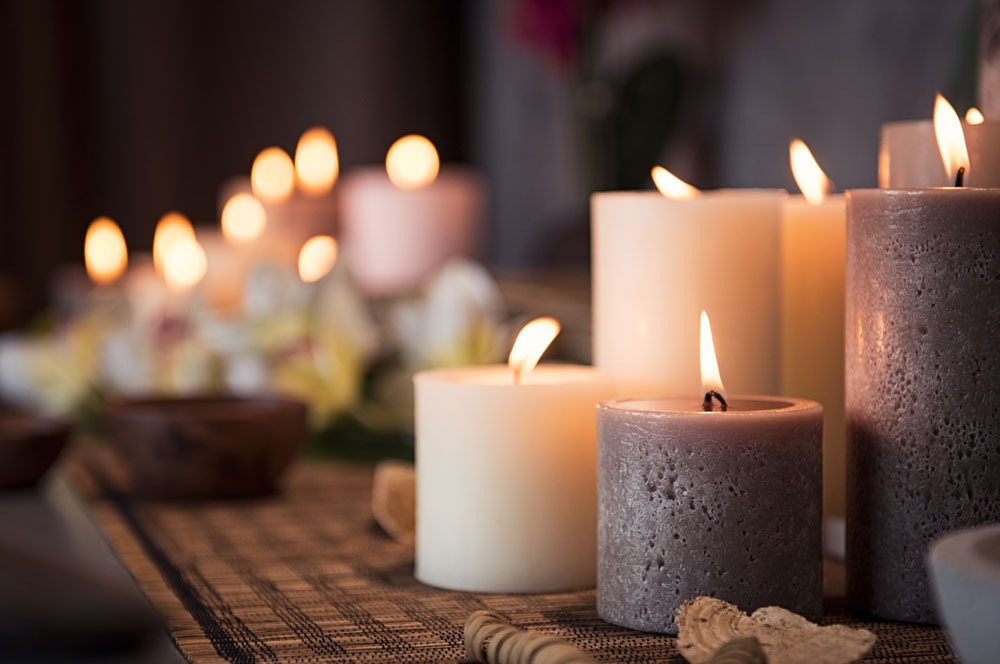Is it Safe to Burn Candles Indoors?
 CONTENTS
CONTENTS
- Can a candle start a fire?
- The other dangers of burning candles indoors
- Cleaning up after a candle fire
- Candle safety tips
- Contact us today
During the colder months, candles become an important feature in the home, whether they are providing us with calm, cosy lighting or being put in a carved pumpkin for Halloween. But candles are one of the biggest causes of house fires and if used improperly can have devastating consequences.
Here at ICE Cleaning, we offer a comprehensive fire damage cleaning service. Our fully qualified technicians have many years of experience restoring residential and commercial properties as close to their previous condition as possible following a fire. They are available nationwide, day and night, 365 days a year.
Keep reading to learn whether candles are a fire hazard and what to do should one cause a fire in your home.
Can a candle start a fire?
Burning candles indoors can bring a sense of calm and warmth to your home, but it's crucial to understand the risks. A lit candle is an open flame which presents potential hazards if not handled carefully.
The obvious danger is fire. According to the NFPA, from 2015 to 2019 candles were reported to cause over 7,400 house fires annually in the US alone. One of the most common causes of a candle starting a fire is leaving them to burn near flammable material, like curtains and furniture. Even a small tea light in a dried-out pumpkin can lead to a serious blaze.
The other dangers of burning candles indoors
Candles can also put people at risk of physical burns, particularly children walking near and around jack-o'-lanterns on Halloween. Children's Halloween costumes are usually classed as toys so they don't follow the same safety standards as clothes and can be flammable.
You may not be aware that some candles, such as scented varieties with synthetic fragrances and dyes, can release pollutants like toluene, benzene, and lead into the air, too. These pollutants could irritate your eyes, nose, and throat, and cause headaches, confusion, and anxiety. Benzene is carcinogenic, as well, and is linked to blood cancers.
Certain people, like those that suffer with chronic lung conditions such as COPD, should be careful about using candles and their exposure to air pollutants.
Cleaning up after a candle fire
In case disaster does strike and a candle does cause a fire to break out, don't panic. Get everyone outside and call the emergency services to extinguish the fire.
Next, once the local authorities have confirmed it is safe to return to the property, make sure it is secure by removing all your valuables, and locking the doors and windows. You should then contact your insurance company to start the restoration process.
Your electricity, gas, and water suppliers must then be contacted so they can be repaired and reconnected by professionals. Finally, professional cleaners should be brought in to clean up the fire damage.
You must never attempt to restore your property yourself because of the dangers fire and smoke damage can pose to your health, such as respiratory issues. Specialist fire damage cleaners will have the training and specialist equipment to safely and thoroughly clean up soot and ash, collect any waste, and neutralise lingering odours. You can be sure that they will make your home safe again.
Even after a small fire, the damage can still put your health at risk. The damage must be cleaned up and the property decontaminated before you can move back in. You can find out more about what to do after a fire in your home in this blog.
Candle safety tips
Keep candles away from flammable objects
To reduce the risk of fire, always place your candle away from flammable materials like curtains, bedding or Halloween costumes. It is recommended you keep a clear space of at least 12 inches around them.
Never leave burning candles unattended
If a burning candle is forgotten about or knocked over accidentally, it can easily lead to a major fire. Extinguish candles before you leave a room and before you go to bed.
Maintain your candle wick length
A wick that is too long can create high flames and soot emissions. To maintain optimal wick length (about 6mm), trim the wick before each use.
Safely extinguish your candles
Rather than blowing out your candles – which can cause hot wax to splatter – consider using a snuffer or dipping the wick into melted wax. You can learn more about burning candles safely on the National Candle Association's website.
Contact us today
Our technicians can provide you with a bespoke restoration plan to suit your specific needs. They have been accredited by a range of organisations including IPAF, SafeContractor, and Dewpoint Professional, and can provide any other services you may require following a fire, like mould remediation. In an emergency, they can be on site within several hours,
To get a free site survey and no-obligation quote for our fire restoration services, contact our team on 0208 066 0360 or enquiries@icecleaning.co.uk.

Speak with me today,
I’m here to help
By asking you a few questions either via phone or email I can immediately provide a realistic estimation of the cost.
You’re in good company. We’ve cleaned for the following commercial clients… View all

Why choose us?
- Cater to a wide variety of cleaning situations
- Nationwide coverage, available 24/7
- Cater to commercial and domestic clients
- Free survey provided prior to quotation
- Emergency response team
- Offer a bespoke service designed to suit all your needs
- All technicians hold professional health and safety qualifications, including BICSc, IOSH, Dewpoint Professional & Safe Contractor
We’re fully accredited
We place best practise, professional expertise and health and safety at the core of our business. We’re fully compliant with all legal obligations. You can view a list of our accreditations below, or visit our Health & Safety page for more information.











-RGB-small.1707319151.jpg)




















